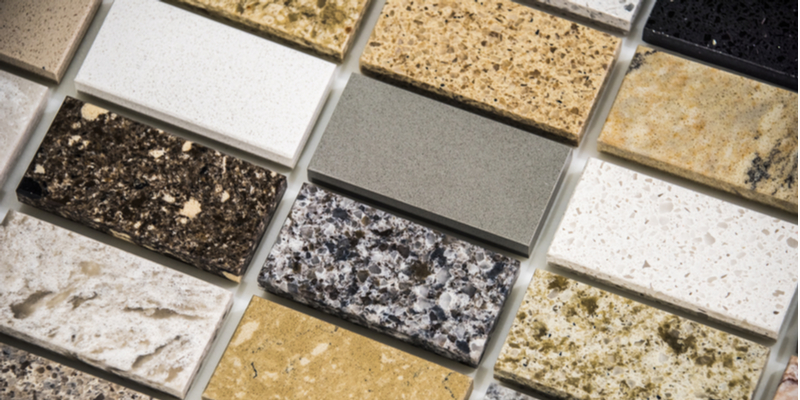If you are preparing to remodel your kitchen, you’ve likely run into the ongoing debate regarding countertops with the two top choices being granite and quartz. Maybe you’ve even set your budget for the remodel and narrowed down your choice to granite or quartz countertops. Both are attractive, but how do you make the final decision? You need the facts about granite and quartz, especially the pros and cons. Let’s compare these two popular countertop materials to help you chose what is best for you and your kitchen.
The Composition
Granite is 100 percent stone (granite), which is mined and then crafted into slabs or tiles. As a natural stone, granite is available in earth tones as well as blues, greens, and reds. No two slabs of granite are alike which means lots of variation in tone and texture.
Quartz is up to 94 percent stone (quartz). Crushed quartz is combined with pigment and resin to create countertops. Quartz, because pigment is added is available in a more wide range of color options.
The Pros of Granite
- Some Granite is offered in oversized slabs, which means you can avoid unsightly seams.
- Granites natural beauty makes it unique in its variations of tones and colors.
- Granite is so distinctive in its appearance, it often becomes the focal point of the kitchen, around which everything else is designed.
- Granite can be used indoors or outdoors.
- Granite won’t weather or fade, as a result of the elements.
- Granite, when sealed properly, is stain resistant.
- Granite is durable with normal use, but it has been known to dull knife blades.
- Granite offers a wide price range from $50 to $150 per square foot ($80 to $175 installed).
The Cons of Granite
- If your kitchen is large, it will likely take several slabs to complete your renovation, which will make seams more evident, as no two slabs are alike.
- Granite, left unsealed or sealed improperly, will absorb liquids and stain permanently.
- In similar fashion, granite will also harbor bacteria, if not sealed properly.
- Granite countertops should be resealed annually.
- Granite is prone to chipping and cracking when a heavy item is dropped on it.
The Pros of Quartz
- Quartz countertops are made of crushed quartz, pigment, and resin, making them available in a multitude of colors and patterns to match your style and design.
- Quartz has the ability to mimic Granite in appearance while being impervious to stain.
- Quartz does not require annual resealing.
- Quartz is stain-resistant and does not harbor viruses or bacteria.
- Quartz is more flexible, making it more durable than granite.
- Quartz does not chip or crack as easily as granite.
The Cons of Quartz
- Quartz seams are obvious, though darker colors help hide seams.
- While quartz attempts to mimic the natural look of granite it can fall short in achieving that goal.
- Quartz generally is more expensive than granite, with prices ranging $70 to $100 per square foot ($80 to $140 installed).
Making Your Decision – Is Granite or Quartz Right for Your Kitchen?
The pros and cons of granite versus quartz countertops have been explored, allowing you the opportunity to make an educated and informed decision for your kitchen remodel. If you still have questions, the team at Tops Kitchen Cabinet and Granite is ready to help you make the selection best for you, your kitchen, and your cooking style. Don’t hesitate to reach out to the Tops Kitchen Cabinet where reliability, service, and the highest quality craftmanship awaits you!

